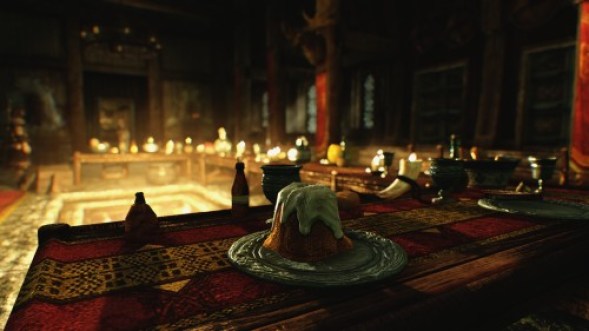Back in high school, one of my history teachers guided us through an exercise designed to stress the importance of determining a person’s Frame of Reference (FOR) to see how that shaped their Point of View (POV).
My history teacher’s point was, that people are, to some extent, the results of their histories. This translates directly to tabletop gaming as well; regional folk tales, growing up in a barracks, associating with ‘low-lifes’ – these things get incorporated into a character and helps us catch a glimpse into their motivations and desires. It gives us a lens through which we can understand a character.

D&D NPCs: Stand Away from the Pack
Our players tend to glob onto NPCs when we least expect it. What determines whether an NPC will exhibit that ‘star-status’ and become beloved by the party?
Sometimes it’s as simple as the voice, or maybe the NPC stands out from the crowd in some way. There’s always SOMETHING, and as a GM you can give your NPCs one unique characteristic that invites the players to welcome them with open arms.
Here are a couple methods that you can use to flesh out your NPCs:
- Cast Away
- My Entire Life Story
- Unique Voice
- Trinkets and Quirks
- Gimme the ‘Block, stat!
Abram, you’re not making any sense! These aren’t real methods! Don’t worry, I’ve outlined the premise of each of these, below.
Creating Memorable NPCs: Cast Away
One of the best ways to get your players to mentally connect with your NPCs is to cast them as an actress/actor. Bonus points if your players recognize the name! Oftentimes, I’ll say who the actor is and then whatever show or movie that they’re from.
The caveat with this is that your players will often have some predisposed attitudes or feelings towards this character if they’ve already seen the flick. Lucky you! Feed those biases and create some red herrings!
Here is more on casting an NPC.
Creating NPCs: My Entire Life Story
You don’t have to go overboard with an extensive lineage through five generations, and you certainly don’t have to write a novel detailing childhood to the present. Even if you’re a player creating a new character, we recommend a simple, story-based process we outline here.
These are NPCs that your players might embrace into the story or maybe the only interaction will be a brief conversation in passing. Putting too much effort into this stage runs the risk of being wasted; that’s not much fun for the GM. Even if you wanted to reuse the backstory elsewhere, you’ll always remember who it originally belonged to. Cue nostalgia.
When developing a backstory for an NPC, the most important thing to establish is how their individual history influenced their current FOR and POV. Sample questions:
- What circumstances led them to hold specific beliefs or feel a certain way about the government, a nearby town, or a close neighbor?
- How did they come to be in their profession?
- Do they have a family?
- Have they always lived here?
- Are they active in the community?
- Where do they spend most of their time?
Typically, I would recommend this kind of depth for an NPC that is guaranteed to play a role in the campaign, because this sort of information will usually only come up as a result of dedicated conversation.
If the PCs visit the baker to buy a sweetroll to bribe a guard, the baker isn’t going to hand them the pastry while mentioning the time they were bullied as a child, which is why they decided to put on a bunch of muscle. There must be context for this backstory to come out.

Create a NPC: Unique Voice
Something as simple as giving your NPCs a unique voice is enough to draw the players into the narrative. Now, if you’re not a professional voice actor (at least 99.9% of us), don’t get stressed out with trying to reinvent the wheel.
In fact, every person in your campaign likely won’t have their own voice: most people native to a specific region are going to share some of the same affectations, inflections, and dialects.
Use this as a baseline for your characters in a specific location. For example, everyone in a village might speak with a Welsh accent, but the blacksmith might be a bit gruffer thanks to years of breathing in thick forge smoke.
Keep in mind that different regions will have unique names for the same thing. I’ll use ‘Shamble-Men” from the Kingkiller Chronicles by Patrick Rothfuss as an example. In the novels, the ‘Shamble-Men’ are monsters who are formed out of the discarded remnants of the harvest and slowly march towards the villages at night. They are a folk tale, however, and only a ‘backwater’ village would believe such tales.
Having your NPCs hold superstitious beliefs, like wearing a phial of salt around their neck or keeping a copy of every holy symbol nearby, can help define a region and give some flavor to their persona. It defines what’s important to them.
I’m looking at you, Beni.
Trinkets & Quirks
A quick and easy method of setting your NPC apart is to give them physical attributes or possessions that are exclusive to them. Whether it be a purple mohawk, a pet ferret, or an ugly brooch, NPCs are bound to have something that nobody else has.
Give them a purpose within society. It might be an actual occupation, hobby, “calling,” or odd-job. Then, think of what that might mean for their belongings and how they might handle themselves.
Take this a step further, and give them the OPPOSITE disposition of what the norm might be. For example, a butcher might be stereotypically described as being a well-fed man with an abrasive personality. However, what if the butcher were a shy woman with quick temper who prefers a foreign blade over the Empire’s steel meat-cleaver? Flip the story on its head.
Jewelry, family heirlooms, pets, weapons, hairstyles, clothing, artifacts, relics, family, occupation, tattoos, piercings, allergies, taste preferences, affinity for ale, specific pronunciations, language barriers – there are numerous possibilities that you can have fun with here.
Make them quirky, not crunchy!

NPC Creation: Gimme the ‘Block, stat!
OK, sometimes you do need the crunch that a stat block provides. You can never guess the reception that your NPCs will get from your players. Conversations run amok far too often, and civilities give way to violence and rolling for initiative. It doesn’t hurt to keep several basic statblocks on-hand to reference in case it starts to go down.
For your average NPC, these statblocks are going to be nondescript and more barebones than a chilly skeleton on All Hallow’s Eve. Keep some mundane weapon stats nearby so you have the damage ready.
Additionally, swap out a feat or two depending on who your character might be. I’m going to plug it again, but Hero Lab by Lone Wolf Development is a fantastic tool in this regard. You can save your portfolios and calculate numbers automatically while you quickly make adjustments mid-session.
Donjon is an excellent resource for generating NPCs on the fly. In the provided link below, a list of NPCs will be created with race, brief physical description, possible weapons/armor, and a sentence of flavor. Sifting through a bunch of these lists can give you some great ideas to start with! This is only the tip of the Donjon iceberg – there are map-making tools, name generators, weather, shop inventory, loot drops…it really is an incredible wealth of information. I highly recommend that you give it a look and poke around to see what jumps out at you.
Link to Donjon Resources.
Remember the Name: Parting Thoughts
This is not a complete list, by any means, and it’s certainly not the final word on NPC creation. You will develop your own style over time and find something that works well with your campaign preparation. Just like there are no two NPCs alike, there isn’t an incorrect method to prepping for your games.
If you are creating an NPC that is going to be a prominent, vital link to the story as a whole, then you’ll probably want to combine a couple of these methods. You can use them for easy descriptions to help your players connect with your setting.
Plus, as you start fleshing out these characters, you will undoubtedly have a better handle on HOW you are going to portray them and get a feel for who they truly are. They will come alive on the table. Well, not literally, but you catch my drift.
Embrace the challenge of the GM, who gets the exciting privilege of walking in the shoes of every character!

